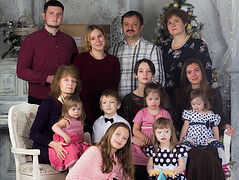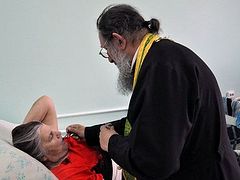If you are death, how can you weep for yourself?
If you are joy, how can you be so sad-faced...
Anna Akhmatova
The New Testament books tell us time and time again about such a human emotion as joy; we can read about joy in many literary works, observe it in movies and theater plays. But no matter how much we try to learn about this feeling theoretically, it would, just like happiness, still remain a challenge when put into practice. In my pastoral experience, I have met many people, and some had all it takes to be inherently happy and full of joy (and why wouldn’t they be? They had health, everything you could wish for in life and then some, like friends and family), but despite all that, life gave them absolutely no joy. Then there were others—their lives were in complete disarray, poor health, no money, and living conditions straight out of the Stone Age—but they were awash with a happiness only a few of us would understand...
Certainly, my observations shouldn’t be taken as a trend. However, they do make one wonder why some of us, for no apparent reason, discover joy and by so doing share it with those around them, while others are like empty shells?!
I happened to read at one of the Sunday’s Divine Liturgy services the Gospel story of the paralytic, and his four friends who took off the roof of the house and lowered their paralyzed friend to the feet of the Savior (Gospel of Luke, 5:17–26). Since this story is so well known, there is no need to retell it here again. I’ll just say that it took me a while to figure out what the story was about.
Just picture this: Four young men, each with their own cherished dreams and desires, or the things they could wish and ask for themselves, acting in a truly selfless way. All four of them here have only one wish: to see their friend healed. But what about their friend? We don’t know anything about him; he’s just a paralytic, a cripple, unable even to speak. And God heeds them precisely because of their boldness, because they brought him and interceded for their friend.
Thoughts kept lingering in my mind about this story. Sure, I knew that there were probably many other, similar examples in history; but in my own life, I had not personally encountered anything like it. Ultimate altruism...
But then the day came when I had the opportunity to witness a similar situation. One day, a doctor from the Rostov Medical University came to our church. She suggested that we learn more about a project called “Hospital Clowns,” a very successful project aimed at helping children undergoing long-term treatment and rehabilitation. A number of the university’s medical students have already participated in this project. After we met with the students, they suggested that I visit the young patients of the Pediatric Oncology and Hematology Department of the children’s regional hospital before the New Year. I agreed without a moment’s hesitation. Soon the day came to go there. The medical students got dressed in clown costumes, and following this group of clowns I entered the hospital. After a brief meeting with a senior physician, we were taken to the children’s wing. It should be noted that as a priest, I am not easily shocked. But in my pastoral experience, I have never seen so many sick children.
The hospital was wonderfully equipped with all the latest technology. The hallways were filled with the children we came to see—some were walking with their mothers, others, completely bald, without eyelashes or eyebrows, moved carefully with the help of nurses, along with the portable IV-drips attached to their veins. Less seriously ill patients were quietly playing in the wards, talking softly or watching television... There was none of the usual noise and commotion expected of children.
The most poignant thing I remembered was their eyes. After all, the eyes are the mirror of the soul. And so, this mirror reflected maturity beyond years, anxiety and a clear understanding of the severity of their sickness. While I was frantically trying to figure out how to help them, our clowns merrily strode down the hospital hallways. They’d enter the patient rooms, greeting the children they had met before and joining them in the feeding process. As they kept the children busy with their games, their moms rushed to give them a few spoonfuls of the food they were unable to eat themselves due to the intoxication and fatigue of chemotherapy. Other clowns joined the medical staff and helped the newly admitted children cope with the fear of injections and IVs. The silence was shattered the entire time we were there, and in a good way. Meanwhile, the volunteers were busy setting up a real New Year’s Eve celebration in the hallway, complete with Grandfather Frost, the Snow Maiden, a concert program, and gifts.
I also found a “job”: many mothers came to talk to me, and it became clear that with all their emotional exhaustion, this was their chance to give vent to all those hidden feelings and emotions. They had no right to cry and break down in front of their children! They wrote prayer requests for their children’s health of and their own, to have enough strength to bear it all and not to break down or lose their minds from those terrible diagnoses.
And so, our volunteers called everyone to gather around the Christmas tree. It was the first time I had been to such a children’s party. The children who weren’t critically ill arrived first and took the best seats. Next came a stream of seriously ill patients: many of them couldn’t part with their IV-drip stands that pumped tons of medicine in their veins. Some were wheeled in their wheelchairs, but others couldn’t even leave their rooms to join in the festivities.
Everyone gathered there. Looking pale, a good half without hair, and those eyes of theirs, which makes you feel uneasy. I admire the smooth work of the volunteers. This seemingly simply volunteering effort actually requires a great deal of self-perfection, adherence to established practices and professionalism. It was obvious that these university students, who chose to work here instead of enjoying personal time, leisure activities and rest, will be doctors with a capital “D” tomorrow, and you won’t be afraid to entrust your health to them.
So, the New Year program whirled away. At usual New Year programs, children are typically expected to recite poems and sing New Year’s songs. But here the children sit around as mere spectators.
Grandfather Frost and the Snow Maiden had arrived, along with the clowns and their gimmicks and tricks. After a while, the first smiles appeared on the children’s faces. Next, they softly called out for the Snow Maiden to come. Why softly? Well, they simply had no energy. Even if there wasn’t the typical unrestrained children’s excitement, the party was a success. The most long-awaited moment came, and everyone received gifts, balloons and toys. They clung tightly to these attributes of childhood—the childhood taken from them by sickness.
They held on tightly to these attributes of childhood—the childhood taken from them by sickness...
The party was over, many of the children were tired and had to retire to their rooms. I felt the urge to approach one of the girls who sat there waiting to be picked up. I bent down and asked her her name, and she answered. Then she asked me whether it was true that I am a batiushka? We took each other’s hands, her tiny, bloodless and cold palms lying in mine. And once again, those eyes, those intelligent eyes, as if belonging to someone who has already lived a long life. These eyes that are hard to look into for a long time, they make you lose your nerve and burst into tears. Soon someone came to pick her up, and we said goodbye. The clowns were collecting their props, and everyone was ready to leave.
As I was waiting for them, I saw an image that wouldn’t leave anyone indifferent: an empty hallway, a bald girl, holding balloons in her hand, struggling to walk towards her room. When she turned to look back at us, our photographer took a picture that would speak volumes without words...
As we were walking towards the exit, we heard the irritated voice of one of the parents from a patient room: “Are you going to eat it or not? Don’t you understand that if you don’t eat up, you’ll die!...?!” It sounded shockingly rude. How was this possible? Had she lost her mind? In response, the volunteers and doctors explained to me that these children were not to be overtly pitied, and since this was the way this family spoke to each other, the mother was advised not to change from her typical rude style she used at home to a compassionate, sweet manner. If the child senses that she pities him as a seriously ill or an incurable patient, it will drain his remaining strength to fight the disease. It took me a long time to digest what I heard and accept it as the norm, but to this day, whenever I remember that moment, my heart automatically sinks...
On our way to the car, we agreed with the volunteers to visit a boy named Sasha, who had been discharged and continued his treatment at home. We decided to go and visit him over the Nativity holidays.
The following Sunday afternoon, at the conclusion of the liturgy, I spoke about our visit to the sick children and said that we are going to wish one of them a merry Christmas at home. The parishioners were invited to contribute their fair share to the purchase of gifts, and they responded wholeheartedly, collecting even more than what was needed. With this money, we decided to buy a computer, a game console, and candy: everything that an eleven-year-old boy could possible want.
On the second day of Christmas, the volunteers and I went to see Sasha. The house where his family lived was classified as dilapidated. We were greeted by Sasha’s mom, a woman worn down by her son’s sickness, the lack of comforts of life and the many challenges of living on the poverty line.
We stepped inside the kitchen. A pile of unwashed dishes. You could physically feel the presence of a father, who was not at home at that moment: the room filled with smoke, the rows of empty bottles—all of that suggested the presence of the “stronger sex” in the household. Even more shocking were the signs of cockroach infestation. It seemed as if they were tame, because nothing, be it the sounds, footsteps or movements around the house, could frighten them at all. It turned out that this family also had a small baby sleeping in a crib. The boy’s mother made a fuss over our arrival, and not knowing how to behave around us, tried to hide dirty diapers as she went and randomly told us about her life. I involuntarily remembered an episode from the movie called “A Million in the Wedding Basket” where wealthy gentlemen paid a visit to a needy family in order to offer charitable support. We were in a similar situation, and so we felt uncomfortable and tense. But the movie had nothing to do with our situation, because it was a comedy...
So, after a brief conversation with the boy’s mom, we finally went to Sasha’s room. He was lying on the bed watching TV, a wheelchair standing next to the bed. The metastases had partially immobilized him and he no longer had control over his lower body and legs. As it turned out, it was the priest whose visit the boy was eagerly awaiting, so the volunteers talked to him for awhile and then left us alone. And once again I looked into those eyes one can’t look into for too long. We got to know each other, I gave him boxes of presents, he thanked me calmly, without the usual childish excitement or joy, only confiding that he’d been dreaming of a computer for a long time. Then, the conversation broke off. We fell silent. I collected my thoughts, contemplating things we could talk about. You reach a mental stupor when you see someone whose future is hopeless because he knows about his diagnosis.
This boy seemed to know much more about life than I did…
This boy seemed to know a lot more about life than I did... I didn’t have to start our conversation because he started talking about himself and his life. When he expressed his hope that he would have at least a few more years to live, I felt like my strength was at a low ebb. He asked if I could hear his confession now, and I assuringly said yes. It was a long confession, like the story of a man who had lived a a long life. It turned out that he had a fervent faith in God that helped him to overcome many challenges and the sickness itself. At the end, I read the prayer of absolution, and then gave him Holy Communion. I suggested to Sasha to come to our church and receive communion again and be my guest. He happily agreed, but then immediately expressed concern about whether his mother would be able to organize the trip; but I reassured him that we would arrange everything for them.
It was time to say goodbye, and I asked him if there was anything else he wanted as a gift. As I said it, I found myself thinking that “a gift” was the easiest thing for adults to resort to, as if we were trying to buy off someone who expects to get more from us. But people like Sasha are almost always looking for sympathy, conversation, and affection.
I was literally stunned by his answer: “Batiushka, I don’t need anything, I have everything. But I have one favor to ask of you. I met Kolya in the hospital, and he is sick too, he has leukemia. He needs frequent transfusions, but the blood bank doesn’t always have that. Could you ask the people at church to donate blood in Kolya’s name? I’m really worried—what if he dies!”
Do you remember how, at the beginning of this story, I was contemplating the story of the four young men and their paralyzed friend from the Gospel and how I wondered whether there were any such people today, willing to sacrifice their interests for the sake of others? Lo and behold, I met a living answer to my question. I must admit, my visit to Sasha was a truly striking experience in my pastoral practice. At a service soon after, I told our parishioners about the visit and the boy’s request. The vast majority of people donated blood for Kolya, and even though we never met him, he became so dear and special to us.
Some time later, we arranged for Sasha to visit our church, where he received Communion, and later we had tea with sweets. Sasha would call me often and we’d talk about anything and everything. He was interested in everything and wasn’t shy to ask about things such as my wife’s name, how many children we had, what books I liked to read, or how I spend my free time—all kinds of questions like that… That’s how a young boy and an adult became friends. And, as a rule, he’d be the one to call me.
But some time passed and the calls from him stopped. I decided to call myself. His mother answered the phone.
“Where’s Sasha? Is he all right?”
“Sasha died,” his mom answered.
And that’s how the short earthly life of a Real Man came to an end.
I found out later that Kolya to whom we donated blood also died soon afterwards. I thought that the friendship of the two boys, which can never be shattered, would continue in eternity.
The Gospel is such an amazing book! It is a once-for-all-time book. It has so many people; we know some of them by name, but there are so many more that the evangelists wrote almost nothing about. And in this multitude of people, there are the good and the evil, the merciful and the not so merciful...
Our life also resembles that Gospel story, if we can still meet such people like those volunteer students or Sasha.





